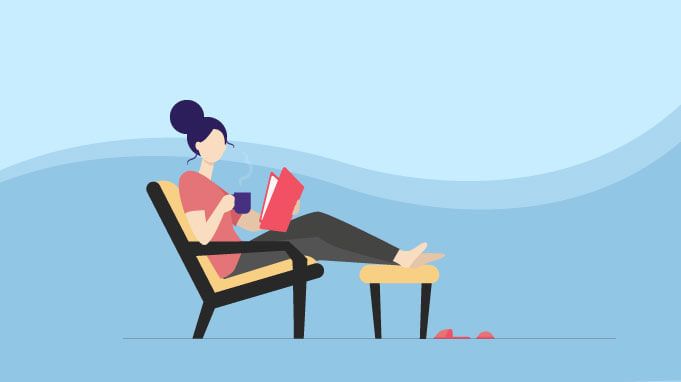Oh, yes, it’s Monday morning and this topic doesn’t look too cool for people resuming work after a weekend!
Turns out, however, that being lazy can be a good thing. Although it may feel counter-intuitive to slow down and take a step back from your usual grind, science shows there are many physical, mental and emotional benefits to letting go of structure and routine from time to time.
Here’s what science has to say about the psychological benefits of ditching structure and focus in lieu of laziness — at least once in a while.
Wandering mind boosts creativity

A recent study published in the Journal of Experimental Psychology: General finds that simply sitting and thinking — allowing your mind to wander — enhances creativity and the ability to problem-solve. Researchers did a variety of experiments in which people were required to predict how much they might enjoy simply sitting and thinking without any distractions like eating, walking around or checking a smartphone. As it turned out, participants found the “lazy” experience more enjoyable than they anticipated.
Indeed, experts say that this kind of thinking can lead to a creative insight or understanding something in a new way.
And when we slow down, it allows us to be more present with other people too. They warn that when we’re on our screens, we’re missing out on social opportunities to connect; whereas quiet time allows us to make more eye contact with people and see other people, notice other people and potentially have more empathy for others.
 Relaxation reduces hospital visits
Relaxation reduces hospital visits
Taking a step back from the hustle and bustle of everyday life to engage in conscious relaxation techniques like meditation, deep breathing and prayer could reduce the need for health care services by 43%, according to a study at Harvard-affiliated Massachusetts General Hospital. That’s because these activities have shown to cut down on stress-related disorders like anxiety and depression, as well as reduce other common manifestations of stress like headaches, back pain, insomnia, reflux, irritable bowel and chest discomfort, which the study reports “are among the most frequent reasons people seek care.”
Experts say persons who engage in these activities (yoga, meditation, tai chi, qigong, breath work, prayer) present as more centered and regulated when it comes to treating depression and anxiety.
They also tend to be less defensive and more hopeful. They develop breath muscle memory that seems more accessible during stressful situations, and they are able to calm themselves when faced with difficulty or frustration. They also sleep better, which likely helps with blood pressure, heart health and anxiety.
Short breaks boost productivity
Zoning out and daydreaming or catching up with a colleague over coffee might present as “lazy” to higher-ups, but it’s actually integral to productivity — and, importantly, to feeling your best.
A study published in the Journal of Organizational Behavior followed office workers in South Korea over the course of 10 workdays and found that microbreaks boosted their energy and ability to mentally recover from work tasks.
Watching TV enhances social intelligence
Binge-watching TV might seem like the laziest possible way to spend your weekend, but research shows that it may actually boost your understanding of how other people’s minds work — a.k.a your social intelligence.
Participants in two separate experiments, published in Psychology of Aesthetics Creativity and the Arts, watched either an award-winning TV drama or a TV documentary. Those who watched a TV drama performed significantly higher on the Reading the Mind in the Eyes Test, which gauges social intelligence, than those who viewed a documentary.

Resting improves your ability to concentrate
Anyone who has juggled a rigorous work schedule with the demands of home life — from parenting to caring for an aging loved one to simply attempting to keep up with chores around the house — knows how burnout can lead to physical and mental consequences, including concentration and memory problems.
But building in time for laziness can promote better focus. In a study published in the journal Educational and Developmental Psychologist, researchers asserted that participants who enjoyed unstructured rest and also took breaks in nature reported higher levels of directed attention than people who just kept working.
Relaxing your mind can lead to awe – and that’s good for well-being
Ultimately, allowing your mind to wander leaves more opportunities for awe, which is powerful for your psyche, scientists say.
Research published in Perspectives on Psychological Science found that awe boosts our sense of meaning, which in turn benefits well-being.
So, the next time you’re tempted to trade a set agenda for chilling out on the couch or taking a walk in nature, know that you’re likely doing both your mind and body a favor.


